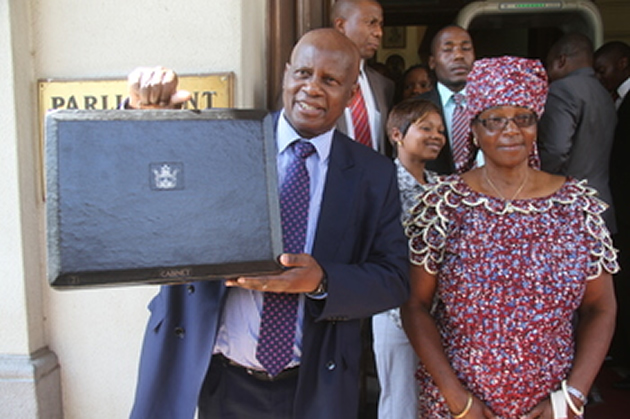Chinamasa moves to cushion local industry


Finance and Economic Development Minister Patrick Chinamasa, accompanied by his wife Monica, displays his briefcase before presenting the 2015 National Budget
Business Reporter
FINANCE Minister Patrick Chinamasa has moved to cushion the financially distressed domestic industry by proposing a raft of tariffs that would increase the cost of importing. Presenting the 2015 National Budget last Thursday, Minister Chinamasa said despite earlier measures to protect industry, its capacity declined from 36,6 percent in 2013 to 33,3 percent.
This comes as $5,3 billion worth of imported products found its way to the local market between January and October 2014, most of which were non-essential, cheap and sub-standard goods.
As such, customs duty on mechanically deboned meat outside the ring-fenced quota will revert to the duty rate of 40 percent, following realisation importers were abusing earlier duty reduction.
The minister thus proposed to ring-fence mechanically deboned meat imported by approved producers at a lower rate of 5 percent, while local meat processors invest in deboning machinery.
To promote local processing of meat products, customs duty on mechanically deboned meat, blend of muscle and other tissues mechanically extracted from chicken carcasses, and key input in production of meat products, has been reduced from 40 percent to 10 percent.
Minister Chinamasa said the reduced customs duty had created opportunity for importation of other meats and meat products under the guise of mechanically deboned meat.
Treasury also contends that the development of the furniture industry, dominated by small players, was being hampered by limited access to capital and stiff competition from imports.
To enhance competitiveness of small manufacturers, minister Chinamasa proposed to provide modest protection on imports of fibre boards and doors and reduce duty on inputs.
As such, duty on fibre boards and doors of thickness from 5mm to 9mm and those exceeding 9mm has been increased from 15 percent to between 20 percent and 25 percent.
Products with density of 0,25g/cm3 and 0,8 cm3 will now pay customs duty at tariffs between 25 percent (SADC countries) and 40 percent (most favored and nation) from 15 percent. Products over 0,5g/cm3 will be levied at between 25 percent (SADC) and 40 percent (MFN).
To protect manufacturers of electrical cables, Government in 2014, introduced customs duty ranging from 20 percent to 30 percent on imported electrical aluminium and copper cables.
Despite the new customs duty regime, imports of other cables that compete directly with copper and aluminium have surged in recent months, which led treasury to raise duty.
Duty for products that include aluminium wire, alloyed and not allowed, winding wire of copper, wire and cable of copper, insulated with poly-ethylene and other electric conductors not exceeding 1 000 volts, were increased between zero and 10 percent to 30 percent.
Government had also earlier put in place an electrical manufacturer’s rebate which provides for duty free importation of components used in the manufacture of electronic ap- pliances.
Minister Chinamasa increased duty for a number of bakery products from 40 percent or 40 percent plus surtax and at least 10 percent and 25 percent duty to either 40 percent or 40 percent plus $1 to $1,50 for products such as mixes, doughs, plain bread, buns and rolls.








Comments